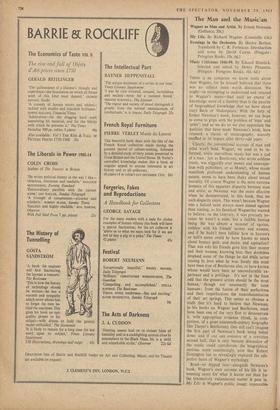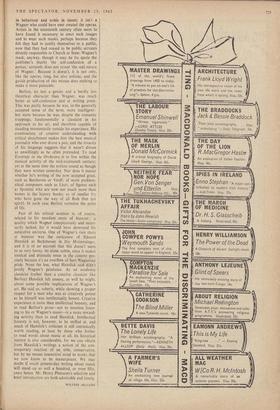The Man and the •Music!an
Wagner as Man and Artist. By Ernest Newman. (Gollancz, 30s.) My Life. By Richard Wagner. (Constable 63s.) Evenings in the Orchestra. By Hector Berlioz. Translated by C. R. Fortescue. Introduction and notes by David Cairns. (Penguin : Peregrine Books, 10s. 6d.)
Music Criticisms 1846-99. By Eduard Hanslick. Selected and edited by Henry Pleasants. (Penguin : Peregrine Books, 10s. 6d.) THERE is no composer we know more about than Wagner, for he himself believed that there was no subject more worth discussion. We might—in attempting to understand and respond to Wagner's music—find such an excess of knowledge more of a liability than is the paucity of biographical knowledge that we have about (say) Bach or Shakespeare. With the help ,of Ernest Newman's book, however, we can hope to come to grips with the problem of 'man' and 'artist'; and as we do so we also appreciate the qualities that have made Newman's book, here reissued, a classic of musicography, scarcely muffled in its impact after thirty-odd years.
Clearly, the conventional account of man and artist won't hold. Wagner, we used to be in- formed, wrote marvellous music bUt was a cad of a man : just as Beethoven, who wrote sublime music, was niggardly over money and unscrupu- lous with publishers; or as Mozart, whose music manifests profound understanding of human nature, seems to have been shaky about sexual morality. Of course Wagner is the most extreme instance of this apparent disparity between man and artist; so Newman was the more effective when he demonstrated, in this book, that no such disparity exists. This wasn't because Wagner was a haloed saint always more sinned against than sinning, as his fanatical Wagnerites wanted to believe; on the contrary, it was precisely be- cause he wasn't a saint, but a fallible human being. He was almost a monster of egoism, ruthless with his friends' money and women; and if he hadn't been fallible how in heaven's or hell's name could he have known so much about human guilt, and desire, and aspiration? That was why his friends gave him their money and their women; knowing him, they doubtless despised some of the things he did while never ceasing to love what he was. Surely this must have been true of Beethoven also, to have known whom would have been an uncomfortable ex- perience and a privilege. It's not in the least odd that the greatest artists should be the most human: though not necessarily the most humane: from the fusion of their perfections and their imperfections the transubstantiation of their art springs. This seems so obvious a truth that it's hard to believe that Newman, in his books on Wagner and Beethoven, must have been one of the very first to demonstrate it, with appropriate evidence (think, in com- parison, of a great nineteenth-century biography like Thayer's Beethoven). One still can't imagine the first part of Newman's book being better done; and if one can conceive of a rewritten second half, that is only because discussion of the music could corroborate the biographical sections more convincingly, now that Robert Donington has so revealingly explored the sub- jective bases of Wagner's mythology.
Read—or dipped into—alongside Newman's book, Wagner's own account of his life is in- teresting more for what it leaves out than for the (excessively voluminous) matter- it puts in.
My Life is Wagner's public image, impeccable in behaviour and noble in intent; it isn't a Wagner who could have ever created the operas. Artists in the nineteenth century often seem to have found it necessary to erect such images and to wear such masks, perhaps because they felt they had to justify themselves to a public, now that they had ceased to be public servants directly responsible to Church or State. Wagner's mask, anyway, though it may be (to quote the publisher's blurb) 'the self-confession of a genius,' certainly does not reveal 'the real nature of Wagner.' Because it doesn't, it is not only, like the operas, long, but also tedious; and. the garish production of this reissue does nothing to make it more palatable.
Berlioz, no less a genius and a hardly less theatrical character than Wagner, was much better at self-confession and at writing prose. This was partly because he was, im the generally accepted sense of the term, more intelligent: but more because he was, despite the romantic trappings, fundamentally a classicist in his approach to his art, and therefore capable of standing momentarily outside his experience. His combination of creative understanding with critical detachment makes him the best musical journalist who ever drove a pen; and the vivacity of his language suggests that it wasn't driven as unwillingly as he often pretended. To read Evenings in the Orchestra is to live within the musical activity of the mid-nineteenth century; yet at the same time the notices sound as though, they were written yesterday. Nor does it matter whether he's writing of the now accepted great, such as Beethoven or Verdi; of more problem- atical composers such as Liszt; of figures such as Spontini who are now not much more than names in the history books; or of smaller fry who have gone the way of all flesh (but not spirit). In each case Berlioz recreates the pulse of life., Part of his critical acumen is, of course. related to his mordant sense of humour: a quality which Wagner conspicuously and neces- sarily lacked, for it would have destroyed his subjective universe. One of Wagner's rare shots at humour was the caricature of Eduard Hanslick as Beckmesser in Die Meistersinger, and it is of no account that this doesn't seem to us very funny, let alone subtle, since it makes musical and dramatic sense in the context pre- cisely because it's an overflow of hurt Wagnerian pride. None the less, what Hanslick said didn't justify Wagner's petulance. As an academic classicist (rather than a creative classicist like Berlioz) Hanslick felt uneasy, as well he might, about some possible implications of Wagner's art. He said so, soberly, while showing a proper respect for a man who was as creatively potent as he himself was intellectually honest. Creative experience is more than intellectual honesty, and to read Berlioz's prose—not to mention listen- ing to his or Wagner's music—is a more reward- ing activity than to read Hanslick. Intellectual honesty is not, however, to be sniffed at, and much of Hanslick's criticism is still intrinsically worth reading, at least by those who bother to read words about music at all. Its historical interest is also considerable, for we can obtain from Hanslick's writings a notion of the con- temporary reaction ofan. able, conservative, but by no means insensitive mind to works that we now know to be masterpieces. We may doubt if much present-day writing about music will stand -up as well a hundred, or even fifty, years hence. Mr. Henry Pleasants's selection and brief introduction are both admirable and timely.
WILFRID MELLERS































































 Previous page
Previous page